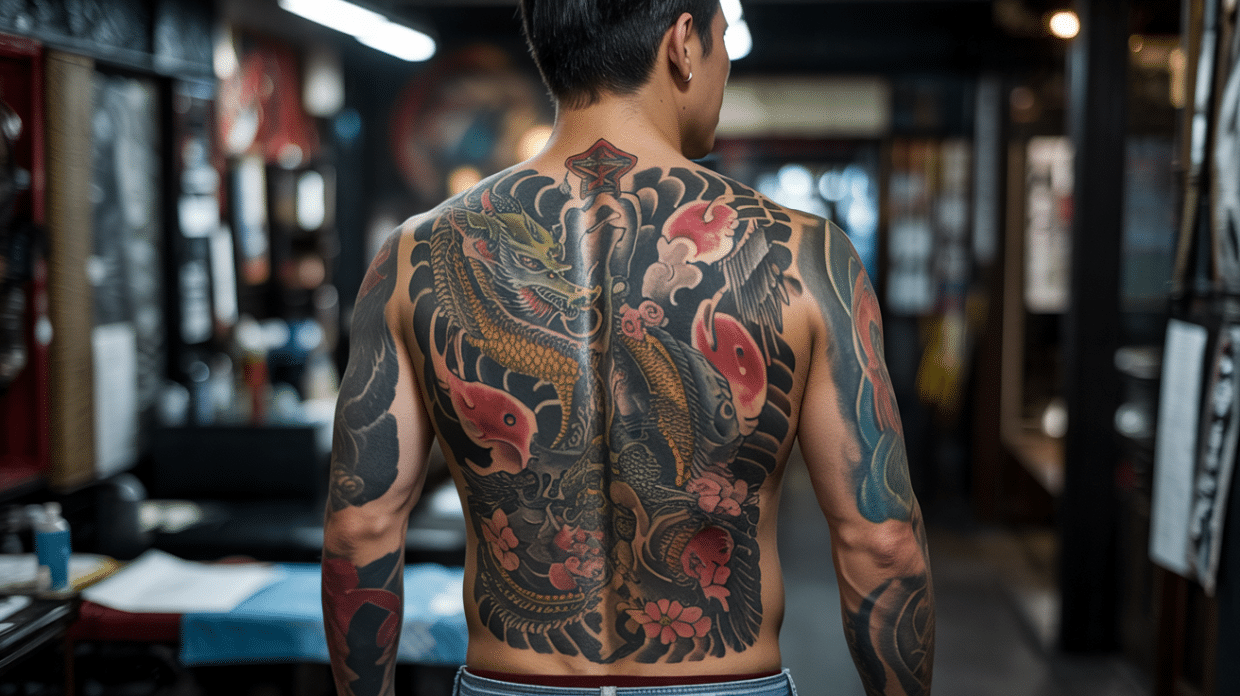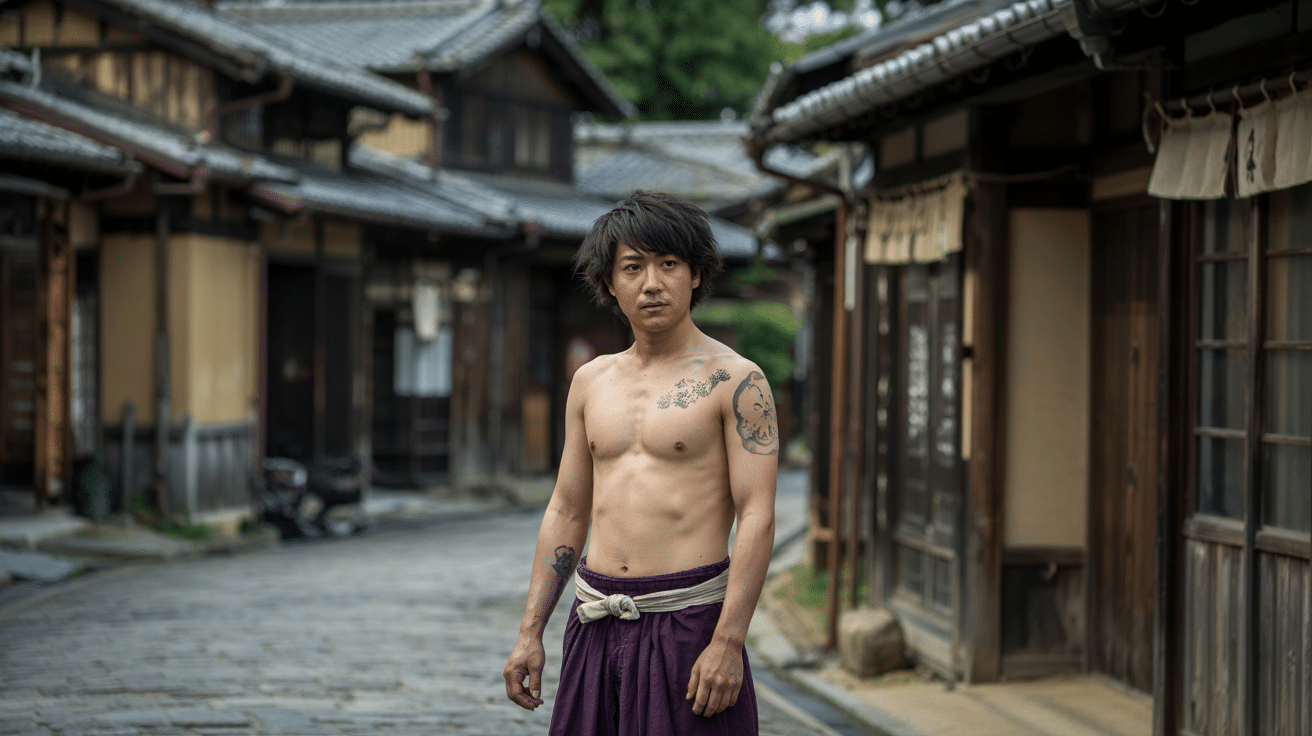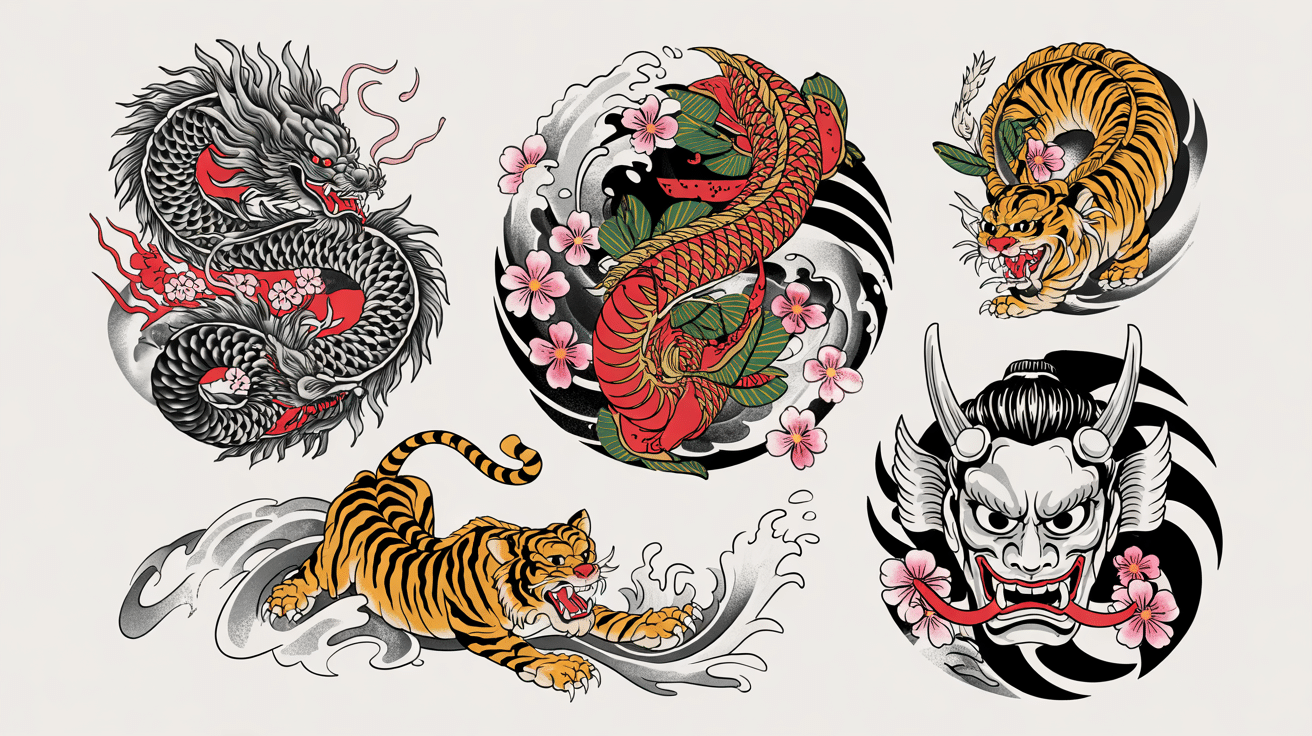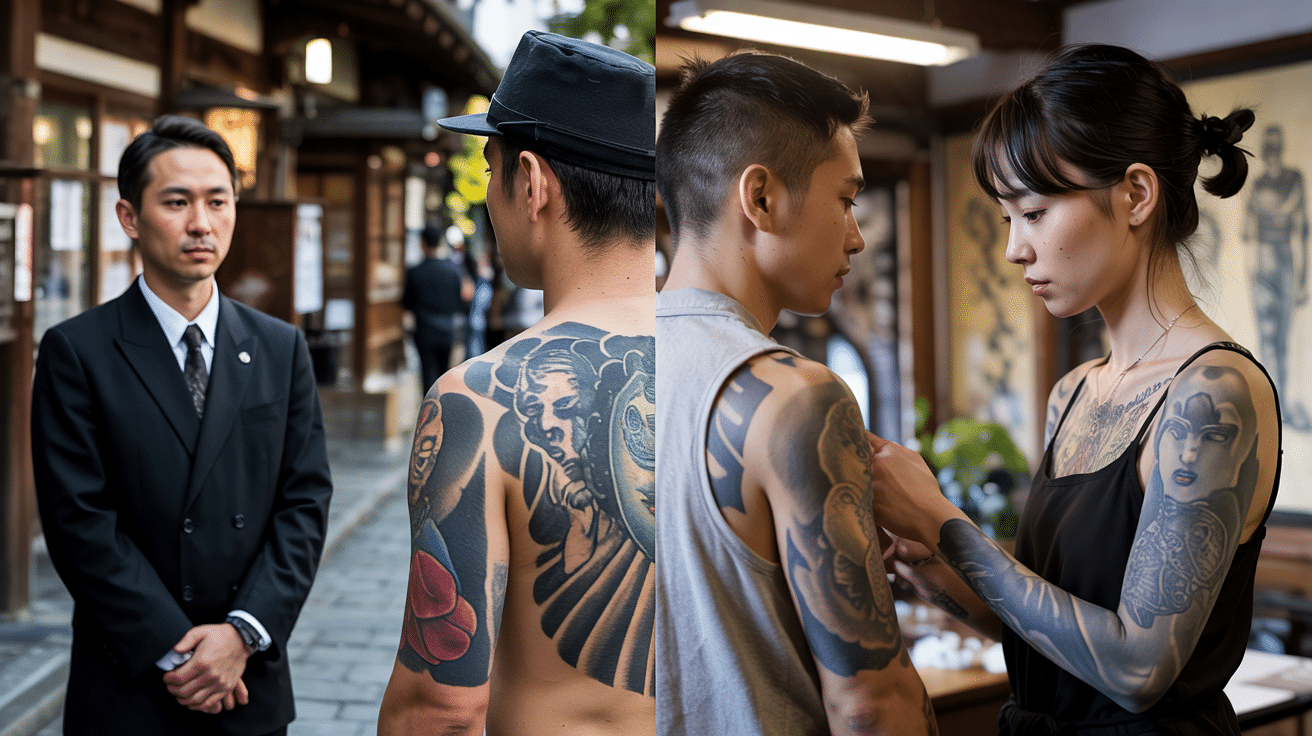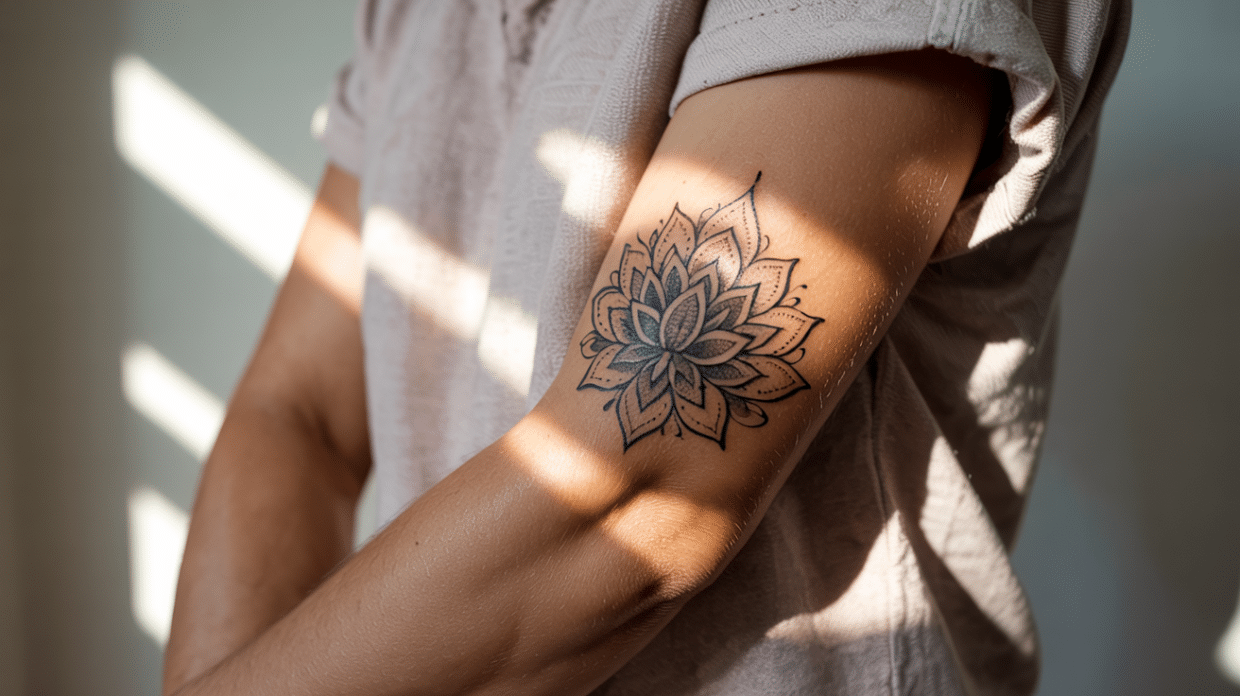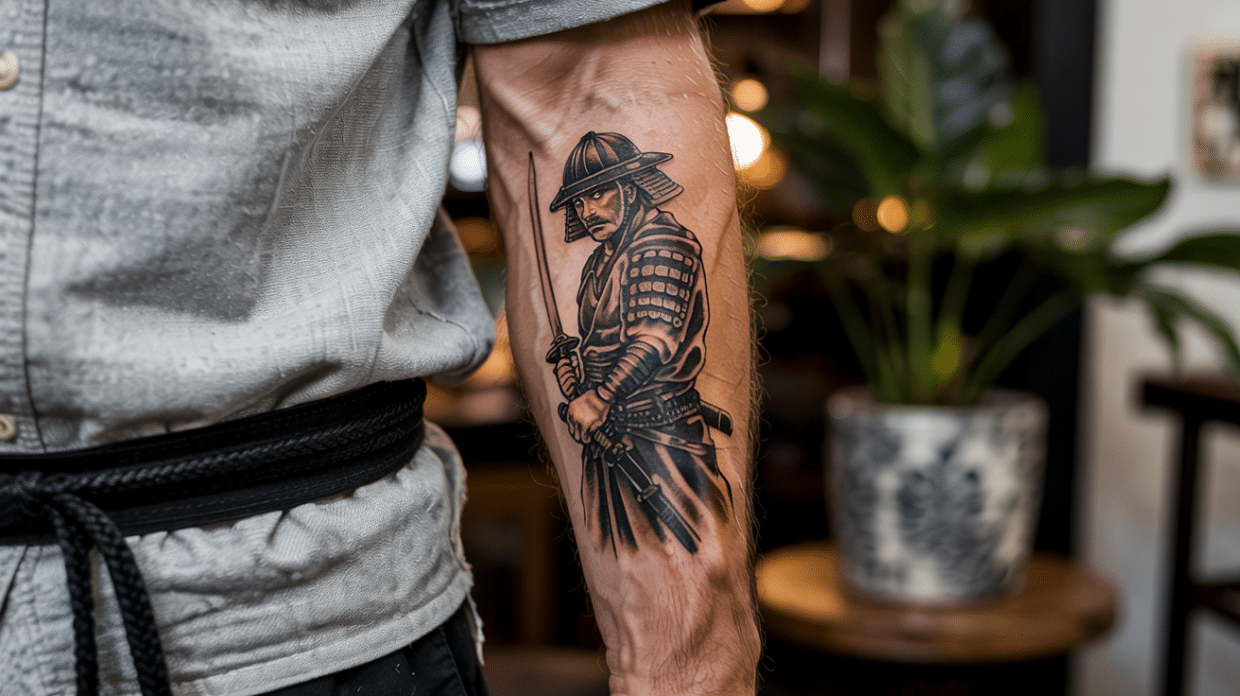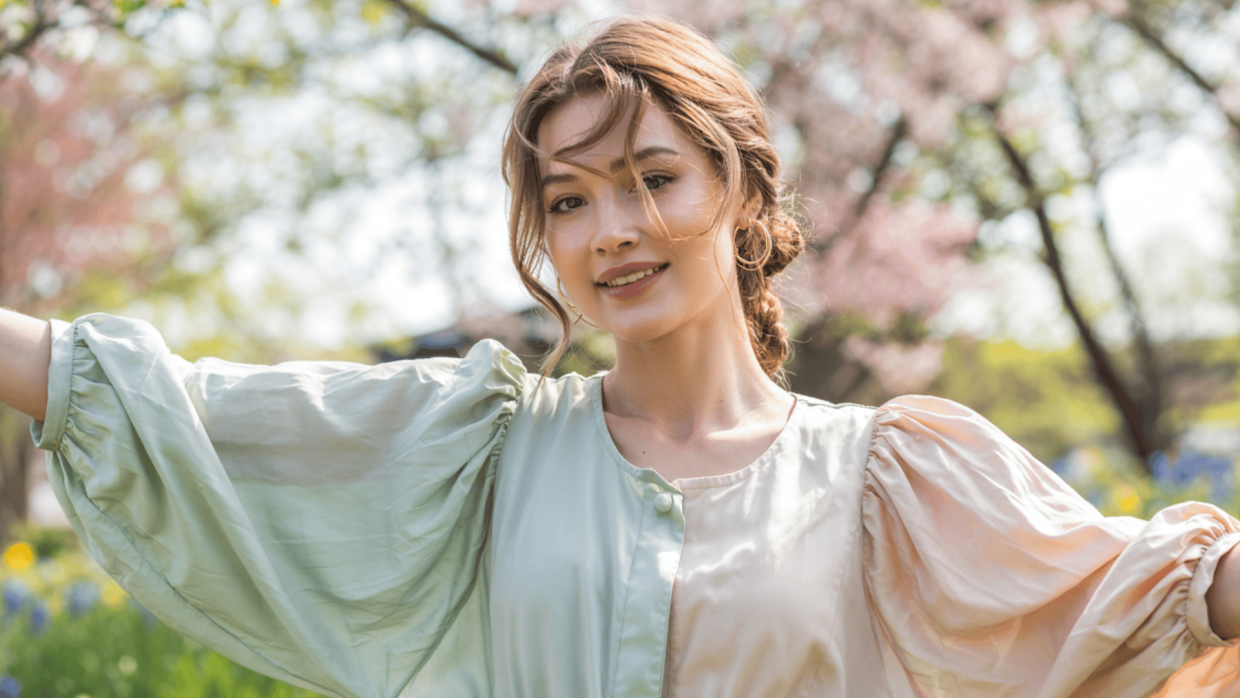Tattoos often say more than words ever could—and Yakuza tattoos speak the loudest. These powerful designs go far beyond looks. They carry emotion, history, and deep meaning.
If you’ve ever felt drawn to bold symbols that tell a personal story, you’re not alone.
In this guide, you’ll learn what each common symbol means and why it matters. You’ll also get a clear view of how tattoo placement connects to the message it carries.
From dragons to koi fish, each design has something to say. This isn’t just about art. It’s about values like loyalty, strength, and respect.
If you’re curious about Yakuza tattoos, this is where you start with honesty and care.
Historical Roots of Yakuza Tattoos
Tattoos linked to the Yakuza have a long past shaped by social and legal shifts in Japan. They first appeared as marks of shame, but over time, they became a way to show strength and identity.
This change laid the foundation for how tattoos are seen in Yakuza groups today.
Tattoos in the Edo Period
Back in the Edo period (1603–1868), tattoos were used to mark people who had broken the law. These marks were plain, often small, and made to shame.
Over time, people began to use tattoos not as a punishment, but as a way to show personal strength.
They slowly became a symbol of standing strong, even when society looked down on them.
Integration into Yakuza Culture
Yakuza groups started using tattoos to show loyalty and rank. The more tattoos someone had, the higher their place in the group.
It was also a sign that they accepted pain and stayed true to the group’s values.
Philosophy Behind Yakuza Tattoos
For members of the Yakuza, tattoos are a type of personal message. They aren’t just about style—they reflect values like bravery, respect, and loyalty.
Getting these tattoos takes hours, sometimes days, of painful work. That pain becomes a test of commitment.
Each tattoo becomes a reminder of who you are and what you’ve stood for.
Common Yakuza Tattoo Symbols and Their Meanings
Yakuza tattoos often feature strong and meaningful symbols. Each design has its own message that connects to values like courage, respect, and loyalty.
Below are some of the most well-known symbols and what they stand for.
1. Dragons
Dragons are common in Yakuza tattoos because they carry deep meaning in Japanese stories and beliefs.
They often show a person who values wisdom, calm thinking, and protection.
In this style of tattooing, dragons are seen as powerful but not out of control. They stand for someone who can be strong when needed, yet still acts with care and respect.
If you wear a dragon, it means you guard what’s important to you while also keeping your actions fair and thoughtful.
2. Koi Fish
The koi fish is known for swimming upstream, even through strong water. This is why it often stands for bravery, steady effort, and not giving up when things get hard.
In Yakuza tattoos, the koi is used to show a person’s inner strength.
It can be a sign that you’ve faced real problems and kept moving forward, even when it would have been easier to stop.
People choose this design to tell a story about growing stronger through experience.
Want to explore more about the koi fish and why it’s one of the most powerful symbols in Japanese tattoo art? Read the full breakdown here: Koi Fish Tattoo Meaning
3. Sakura (Cherry Blossoms)
Sakura flowers, or cherry blossoms, bloom for only a short time. This reminds people that life moves quickly and can change in a moment.
In Yakuza tattoo art, this flower is used to show how someone understands the brief nature of life.
It’s a quiet and clear message that beauty doesn’t last forever, so it should be valued while it’s here.
It may also be worn to remember a person or a time that passed quickly but mattered deeply.
4. Tigers
Tigers are linked to courage and strength. They are seen as animals that stand alone and protect themselves.
In Yakuza tattoos, tigers are used to show bravery and the ability to stay firm even when trouble shows up.
These designs may be chosen by someone who wants to keep danger away or who feels that they need to defend what they care about.
It’s also a sign of bold character and sharp instinct.
5. Snakes
In Japanese tattoo culture, snakes are signs of safety, careful choices, and starting again. They often mean that the person has gone through a change or is always staying alert to what’s around them.
A snake can also stand for the ability to heal, both inside and out.
In the Yakuza setting, these tattoos may show someone who is not only thoughtful but also ready to change when needed to stay strong and safe.
6. Samurai
Samurai were warriors in Japan who lived by a strong set of rules. They focused on values like honesty, duty, and deep respect.
A samurai tattoo is often chosen by someone who feels close to those same ideas.
It shows that you want to live with purpose, stand by your word, and never back away from doing what’s right.
In Yakuza culture, wearing this symbol is a clear way of saying that loyalty and self-control matter.
7. Oni (Demons) and Namakubi (Severed Heads)
Oni, which are demon-like figures, are used in tattoos to show power over fear and bad forces.
They aren’t meant to scare others. Instead, they stand for the strength it takes to face danger and not look away.
Namakubi, or severed heads, have a more serious message. They can show a lack of fear in the face of harm, or mark a deep act of strength or duty.
These designs are bold and carry a strong meaning about facing hard truths head-on.
Tattoo Placement and Hidden Meanings
Yakuza tattoos often cover the whole back, arms, legs, and chest. This full-body style is called irezumi. It’s done in a way that the tattoos stay hidden under clothes. Only hands and neck may be visible.
This isn’t random. It lets members blend in when needed. It also protects their place in society while keeping the meaning of the tattoo close to the body.
Placement can also show rank. A full-body tattoo means you’ve committed. Smaller tattoos may mean you’re newer or hold a lower place in the group.
Gender Differences in Yakuza Tattoos
Yakuza tattoos reflect different values for men and women. Men often choose bold designs that show strength and loyalty.
Women may go for softer images that speak to protection, beauty, or quiet power.
| Group | Common Tattoo Themes | What They Represent |
|---|---|---|
| Men | Dragons, Samurai | Strength, loyalty, protection, and personal values |
| Women | Flowers, Birds, Water, Koi, Phoenixes | Calmness, inner strength, beauty, personal growth, courage |
Cultural Interpretation vs. Modern Interest
In Japan, tattoos still carry a strong link to crime, which affects how people view them.
Outside Japan, many people are drawn to the designs for their detail and deep meaning. This difference shows how culture shapes the way tattoos are accepted or rejected.
How Yakuza Tattoos are Viewed Today
In Japan, people with tattoos may still face limits. Some spas, gyms, and public places ask people to cover tattoos.
The view on tattoos in Japan is slowly changing, but it’s still not fully open.
Many younger people and visitors from other countries see these tattoos as strong or artistic. Some see them as a link to deep values, not crime.
Do Modern Yakuza Still Wear Them?
Today, some younger members of the Yakuza avoid tattoos to avoid drawing attention.
Even so, many still choose to wear them as a sign of loyalty, strength, or history within the group.
These tattoos may not always be visible in daily life. Members often keep them covered to avoid unwanted attention in public spaces, workplaces, or while traveling.
Why Foreigners are Drawn to These Designs
Outside Japan, people are often interested in the detail, skill, and symbolic meaning of these tattoos.
For some, they reflect values like courage, loyalty, and personal strength.
Others are drawn to the style because of its connection to Japanese tradition, even if they don’t belong to the Yakuza or Japanese culture.
This interest continues to grow, especially among tattoo artists and fans who respect the deep meaning behind each image.
Ethical Considerations
Before getting a Yakuza-style tattoo, it’s important to understand where it comes from. These designs carry deep cultural meaning and are linked to a specific group in Japan.
Using them without knowing the background can upset those who see them as more than just body art.
Taking time to learn shows respect for the people and the tradition behind the work.
Is It Okay to Get a Yakuza Tattoo?
This is a good question. If you’re not part of the Yakuza, you still might like the design or symbols.
That’s okay, but it’s good to learn the history and meaning before making that choice.
Cultural Appreciation vs. Taking Without Knowing
Wearing a Yakuza-style tattoo without knowing its meaning may upset others.
It’s better to show respect, learn what it stands for, and make sure the design fits your own story.
How to Be Respectful
- Learn what your chosen symbol means
- Speak to a tattoo artist who understands Japanese art
- Avoid copying full Yakuza body suits if you don’t know the context
When you take time to learn, you show respect to the culture and its values.
Conclusion
Yakuza tattoos are more than a design. They carry meaning, speak of values, and show a deep link to Japanese tradition.
Before you think about getting one, try to understand what it means and how it’s seen in both Japan and other parts of the world.
By learning the meaning and showing respect, you can choose designs that speak to your own story in a thoughtful way.


